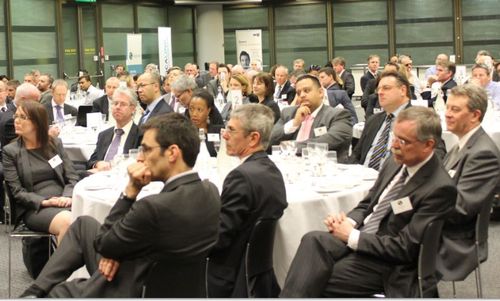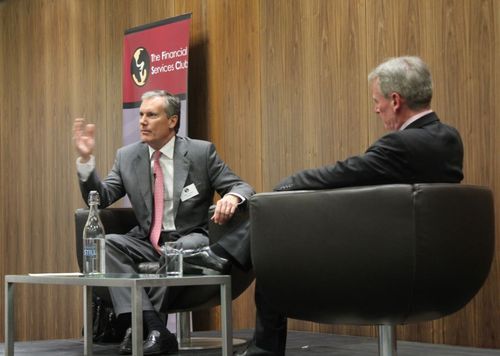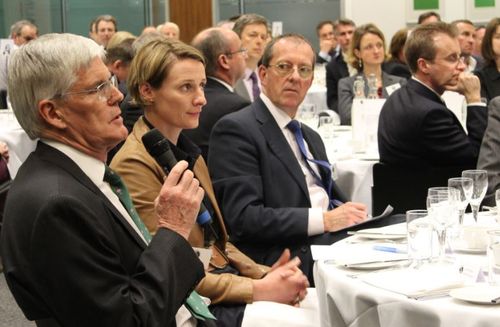
We had a great meeting at the Financial Services Club this week with Lazaro Campos, CEO of SWIFT.
Lazaro took part in a one to one interview about SWIFT’s past, present and future, and delved into many areas that were of interest to the over one hundred members who joined us.

The evening was all under the Chatham House Rule, so I cannot report what Lazaro said, but here are the four areas we delved into.
- first, is SWIFT a puppet of government machinery after ejecting Iran from the network;
- second, how has SWIFT changed in the forty years since the co-operative began and what are the big developments in the future;
- third, what does the co-operative versus co-opetition debate mean for the organisation; and
- finally, how does innotribe and innovation fit.
On the first area, Lazaro made it clear that there was a legal mandate to act, delivered to the company through the European Council of the EU (member states) which prohibits provision of financial messaging services to the EU-sanctioned Iranian banks.
Because SWIFT is incorporated in Belgium, they were therefore forced to comply with this new law, and were instructed by the Belgian authorities to do so.
My take on it is that this is effectively a movement for SWIFT to comply with the wishes of the United Western Nations.
The United Western Nations are the Americans and Europeans, as if America wants something the Europeans will comply.
It would be interestng to see what would happen if the full United Nations were debating such points, and the Chinese or Russians veto the move.
This is an interesting point., as SWIFT has been caught out by government interference from the USA before. The argument was the same back then: they had been subpoenaed by the SEC to provide all records that might relate to terrorist financing under the Terrorist Finance Tracking Program (TFTP).
It’s a tough call as, when divulgence of the transaction records for the TFTP were discovered by a New York Times journalist, there was a palpable sense of embarrassment as a result.
I remember Lazaro’s predecessor Lenny Schrank saying to me that he hoped the journalist was proud of his actions as he walked upon the graves of his colleagues after the next terrorist atrocity in America.
It’s easy to say that America’s terrorist policies and anti-Iranian views are correct when America is the superpower; I wonder how SWIFT will behave when China takes over as the worlds’ largest economy in a few years?
Maybe it would be better if the legal mandate to force SWIFT to act on behalf of a government were served by the full United Nations, rather than the United Western Nations.

On the second point, we had a good discussion about the last forty years, from SWIFT’s creation as a secure electronic replacement for telex transmissions to what SWIFT’s role exists for today.
SWIFT have come a long way from payments to messaging to transaction management, but its position is not unassailable. Many believe that there are alternatives to SWIFT, using secure internet processing via the network providers for example.
Quite rightly, SWIFT point to the power of their network, community, platform and influence over standards, which brings a global harmony to cross-border bank processing.
True, but so could a global TARGET2.
And what if the Chinese wanted to create a superpowered clearing infrastructure and transaction system?
Could SWIFT halt such influence or approach?
These are questions that float over SWIFT’s strategy, and it will be interesting to see how their strategy meets these challenges.
The third area we delved into is how the community cooperative can raise challenges with their community when they push things too fast or too slowly.
Can they keep up with the demands of the needy, whilst also keeping their community satisfied that the solutions being delivered are right and appropriate.?
Will the Unified Framework that SWIFT is working with FIX and FPML deliver harmony?
How can vendors ensure SWIFT does not displace their solutions?
These question were dodged slightly, with a view that smaller banks are often more demanding of faster cycle change than larger ones; that SWIFT’s shareholder is their bank community and that’s who they have to be accountable to and for, rather than the vendor community; and that yes, the unification has been tried before, but it’s always worth trying again.
True.
However, I have a sense that it’s maybe too difficult to get these disparate groups – the bank community, buy and sell side, vendors and network providers , infrastructures and governments – to all be brokered by SWIFT into one harmonious, interoperable whole.
We shall see.
Finally, we discussed innovation and this is where I think we had the most important piece of dialogue as, quite rightly, Lazaro put forward the view that SWIFT has the most influential capability of all.
When it comes to innovation, SWIFT is able to drive the industry forward.
That’s what was achieved with SWIFT XML and can be achieved again today through innotribe.
This is why innovation is so much at the heart of Lazaro’s and SWIFT’s view of the world.
And that’s good.
I hope we succeed in achieving just that – innovation – through working with SWIFT and the innotribe team in the future.
The evening ended with a wide ranging series of questions from SWIFT working globally and locally, to policing individual bank activities to providing greater reach and infrastructure.

My walk away is that SWIFT is doing what it does best: steering its course through the choppy waters of banking with drive and vision, whilst trying to balance the needs of an extremely diverse community of demanding banks, vendors, technology firms and more.
And Captain Campos is doing his utmost to ensure the good ship avoids the rocks.
Chris M Skinner
Chris Skinner is best known as an independent commentator on the financial markets through his blog, TheFinanser.com, as author of the bestselling book Digital Bank, and Chair of the European networking forum the Financial Services Club. He has been voted one of the most influential people in banking by The Financial Brand (as well as one of the best blogs), a FinTech Titan (Next Bank), one of the Fintech Leaders you need to follow (City AM, Deluxe and Jax Finance), as well as one of the Top 40 most influential people in financial technology by the Wall Street Journal's Financial News. To learn more click here...

